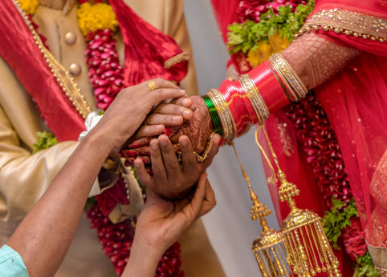Arranged marriages
Arranged marriages are a cultural in all families, rather than individuals, its play an important role in the matchmaking process. Arrange marriages is influenced by cultural, religious beliefs. Here are some important points about marriages:

Cultural Diversity:
- Arranged marriages are prevalent in various cultures in all over the world, including USA, UK, South Asia, the Middle East, and some communities in Africa and Asia also.
- All cultures have different approaches to arranging marriages, and the level of involvement of the families in different ways.
- Family Involvement:
- In arranged marriages, families take an active role in selecting potential partners for their children.
- Old time Family and parents were searching partner in friend and family or in know families.These days in metros families or all over the world we are searching life partner by online website also.
- metrosmatrimony.com
- The criteria for selection (Partner Preference) may include factors such as Age, height, caste, religion, socio-economic status, education, Profession and family background.
- Compatibility Considerations:
- In marriages may involve external factors in the Partner preference, most of the families also consider compatibility between the individuals as well as in Family.
- Compatibility factors can include shared values, Hobbies, Liking, interests, and personality traits.
- Modern Adaptations:
- In some families, arranged marriages have evolved to incorporate modern elements, such as the involvement of the person in the decision-making process.
- Matchmaking may involve Face to Face meeting, Introduction facilitated by family, but individuals may have the final say in choosing their life partner.
- Success Stories:
- Success in arranged marriages varies, and factors like mutual understanding, family support, communication, and commitment play crucial roles.
Arranged marriages have been successful, highlighting the importance of compatibility and adaptability.
In India, arranged marriages culture have been a traditional practice for centuries. It’s Written in Holy Books also. While customs, religion and practices can vary across regions and communities, there are some common points in the arranged marriage process.
It’s very important to approach this topic with cultural sensitivity, Religion, recognizing that different societies have diverse perspectives on marriage. The success of marriages depends on the willingness of the individuals (Bride & Groom) involved to work towards building a strong, supportive relationship.
Matchmaking:
- Life Partner search is first initiated by the families of the prospective bride and groom.
- Families may seek suitable partner based on factors such as caste, social status, education, Profession, Location, Income family background, and horoscope compatibility.
Horoscope Matching:
- Kundali Matching (Astrological compatibility), as determined by the horoscopes of the prospective couple, is often considered in Hindu arranged marriages.
- An astrologer may be consulted to ensure that the stars align favourably for the couple.
- These days online Horoscope matching is common.
Family Involvement:
- The involvement of families is a significant aspect of marriages.
- Parents and Friend, Relatives, extended family members play an active role in the matchmaking process, and their opinions are often considered important.
Arranged Meetings:
- Once a suitable match is found, families may arrange for the prospective bride and groom to face to face meet and interact.
- These meetings are typically facilitated by family members or intermediaries, or Professional Match maker.
Consent:
- It is important for both the bride and groom to give their consent before proceeding with the marriage.
Engagement Ceremony:
- After the face-to-face meetings and when both families are satisfied and consent with the match, an engagement ceremony may take place.
- Engagement ceremony formalizes the commitment between the couple and their families.
Wedding Rituals:
- Weddings involve a series of elaborate customs, rituals and ceremonies. These can vary based on regional customs as per holy books and the specific traditions of the families involved.
- Common rituals of Hindu weddings include the exchange of Phare (saptapadi), the tying of the Mangal sutra, and the application of Kanya Dan Sindoor on the bride’s forehead.
- These days in metros due to time issue people are arranging all ceremony on the same place with coordination of event companies like: www.wedmegood.com/
Post-Marriage Customs:
- After the Marriage, there are often post-marriage customs and rituals, including Vidaai, receptions, where the newly married couple is introduced to the extended family and community.
Conclusion-
Marriage is a beautiful bond between 2 family. Its a life long relation between Bride and Groom. We all need to understand its value in our life and also we should follow our customs for a successful married life.
FAQ:-
Q No-1
What is important For Happy Marriage?
Ans1-For Every Marriage we need to understand value of our partner in our life.
Q No-2 How we search a perfect life partner?
Ans2-Their are so many ways to find a perfect life partner-So will search from online portal or with matchmaking services.
Q No-3
What is the importance of marriage in our life?
Ans3-Humans are social person, to survive our life -we all need a life partner who understand us, give a wonderful meaning of our life.

No responses yet